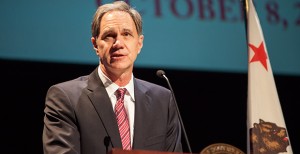’SC hosts daylong conference to support veterans
USC Sol Price School of Public Policy hosted a conference Tuesday on the critical issues facing veterans returning from war, including re-entering the workforce and the high rates of homelessness.

Veteran support · Dean of USC Price School of Public Policy Jack Knott speaks about the importance of improving the quality of life of veterans returning from war. USC hosted a conference for public service leaders on Tuesday at Bovard Auditorium. – Ralf Cheung | Daily Trojan
Former Director of the Central Intelligence Agency and USC professor Gen. David Petraeus spoke at the beginning of the conference.
Petraeus spoke about the veterans coming home from serving in Iraq and Afghanistan and reminded the audience of the tremendous service veterans provide to the nation.
“The post-9/11 veterans have come to be deservedly recognized as the new greatest generation,” he said. “America has never had a group of men and women who have spent as long in combat, with over two million of them having served in Iraq and Afghanistan.”
Petraeus also introduced the topic of supporting veterans returning from combat.
“While our country continues to provide support for our veterans and their families, we can and we should do more, and I know that those here share that conviction,” Petraeus said.
The conference featured keynote speakers that included Jacob Wood, former U.S. Marine and president and co-founder of Team Rubicon, a humanitarian disaster relief group.
Wood’s organization gathers groups of veterans who then go provide disaster relief all over the world. Humanitarian projects Team Rubicon has been involved with include relief for the victims of Hurricane Sandy and the 2010 earthquake in Haiti.
Wood said his inspiration for creating disaster relief efforts came from his experiences serving as a medical aid to people injured in natural disasters.
“When I was working on a bullet wound on a young boy, I realized that these hands that I had that were trained for war could just as easily be trained for peace,” Wood said.
Wood also spoke about veterans’ issues and how his organization combines veterans’ needs to provide for and defend their country with the need for volunteers in disaster relief.
“One problem was that we had inadequate disaster response and the other was the need [for] veterans to feel something better,” Wood said. “We sat there and realized that these aren’t actually two problems but rather two mutually supporting solutions.”
Los Angeles Mayor Eric Garcetti gave a keynote speech that emphasized assisting veterans to transition back into civilian life. Garcetti addressed the issues that veterans living in Los Angeles face.
“We need to ensure that veterans today can return home to bright futures,” he said. “Making sure that there’s basic opportunities for all Angelenos, especially those who have put their lives on the line for our nation, is essential.”
Garcetti specifically pointed to the Veterans’ Affairs offices and the lack of assistance that veterans seem to be getting from the organization.
“Veterans in Los Angeles face on average 377 days to receive responses to their Veterans’ Affairs claims. That’s unacceptable,” Garcetti said.
The mayor also addressed the issue of veterans re-entering the civilian workforce.
“Let’s also make sure that our veterans’ skills are being put to work for use in the workplace by connecting them with training and placement,” he said. “We’ve seen amazing organizations who train veterans for careers in growing industries.”
Garcetti also offered suggestions for how USC students could help the efforts providing veterans with the resources they need when returning from service.
“Setting up a student-to-student help hotline or looking for those veterans and reaching out to them would be so beneficial,” Garcetti told the Daily Trojan. “Veterans are often invisible because they look like the rest of campus, and I think students can help students better than anyone else can.”
The conference concluded with a screening of HBO’s Alive Day Memories: Home from Iraq. The documentary featured interviews with Iraq War veterans who suffered emotional trauma.
The veterans featured in the documentary recounted their “alive days”: the days they each narrowly escaped death.
One such veteran, Sgt. Bryan Anderson, described the surreal experience of losing both of his legs and his left arm in a bombing during his time in Iraq. Anderson noted that the most important thing was his independence, which was taken from him the day he was injured.
First Lt. Dawn Halfaker, who underwent an amputation of her right arm, spoke about the importance of the documentary after the screening.
“It told the story of our lives, and I’m grateful that it felt like a safe place to talk about what had happened to me,” Halfaker said.
Students responded to the documentary screening with varied insights on how to assist in veterans’ causes. Adam Syed, a junior majoring in psychology, addressed the issue of veterans’ affairs as being different than other relief efforts.
“I think veterans’ issues are a lot less hands-on than other humanitarian efforts like raising money for charity,” Syed said. “It’s not really something that one student can do alone. A lot of people have to really band together to see real results.”
Jessyka Linton, a senior majoring in political science, said she views awareness as the most important aspect of being a part of the efforts in alleviating veterans’ issues.
“Events like these are so interesting because they’re really the first step into the relief efforts,” Linton said. “You really can’t help if you’re not aware of the issues at hand, so I’d say the first thing to do is be informed about these important topics.”
